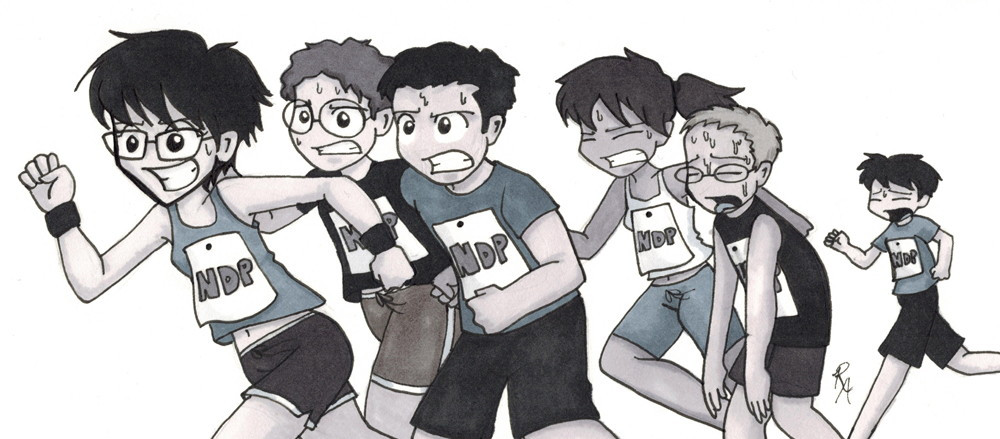NDP leadership race is on as party battles over its soul
Mulcair the only candidate that can form New Democratic government
Over the last two months, I have been conducting interviews with each of the federal NDP leadership candidates in the lead-up to this weekend’s (March 23-24) historic convention, where the party will choose its new leader.
Six out of seven of the candidates have responded promptly and have graciously spent 20 to 30 minutes of their time speaking with me.
The only candidate not to do so is Quebec MP Thomas Mulcair, the perceived front-runner in this highly contested race.
In late February, Mr. Mulcair visited the University of Winnipeg and gave a lecture to a large classroom of politics students.
The NDP needs to expand beyond its traditional base, he said, to appeal to young people, students and new Canadians with a message of hope.
He then proceeded to take questions from the group of inquisitive young students. The tone of his responses can only be described as bizarre - he was confrontational and less than gracious with those who asked questions.
When I approached him after the uncomfortable question and answer period, I asked who I should speak with to arrange an interview. He said he was not giving interviews that day and could not give an interview at any time before the convention.
I attempted repeatedly after that to get in touch with his campaign manager, Raoul Gebert.
The only response I received from Gebert over the last three weeks was this, when I initially contacted him: “We appreciate your interest in the campaign, however Mr. Mulcair’s schedule is wall-to-wall for the moment. Should anything open up, we’ll let you know.”
It is startlingly hypocritical to claim to be reaching out to young people while acting confrontational when faced with their questions during what should have been a standard PR exercise and then refusing to speak with student journalists.
However, hypocrisy alone has never disqualified any politician.
The NDP has been in a battle over its soul for the last six months.
Going into the leadership convention this weekend, party members are struggling with far more than just electing a likeable leader.
New Democrats are grappling with how to amend party policies in order to gain the confidence of average Canadians to manage the economy while simultaneously not sacrificing the party’s socialist soul to big business or big oil.
They seek to connect burgeoning British Columbia, where the party has firm provincial roots, with Quebec, where the party has only saplings, despite 58 MPs and a massive popular mandate from the province.
All the while they talk of building in Ontario and reuniting with the party’s birthplace in the middle, on the Prairies, where voters may support the NDP provincially while remaining solidly blue federally.
New Democrats are attempting to build this coalition in the face of a now strong, almost insurmountable Conservative coalition between economically bleak Ontario on the one hand, and oil-rich Alberta on the other.
And these are not the only challenges the next leader will face.
In the event of a Parti Quebecois win in the upcoming Quebec provincial election, the next leader will have to deal with the awkward consequences of a hostile provincial government, which may agree with the party on policy, but which seeks ultimately to break up the country.
“ It doesn’t just take a candidate with good French speaking skills and a charismatic personality who can spout boilerplate rhetoric in the fashion of unsuccessful leaders in the 1990s. This undertaking requires a politician with strategic acumen to rival Stephen Harper
In such an event, the new NDP leader will have to stave off the inevitable uptick in Bloc Quebecois support that would arise from such a victory.
And then, all across the country, there are those damn Liberals to squeeze out or take on.
This is an undertaking of gargantuan proportions.
It doesn’t just take a candidate with good French speaking skills and a charismatic personality who can spout boilerplate rhetoric in the fashion of unsuccessful leaders in the 1990s.
This undertaking requires a politician with strategic acumen to rival Stephen Harper.
Since becoming Conservative leader in 2004, the prime minister has attempted to build a Conservative coalition between soft Quebec nationalists, Western populists and traditional Tories, including right-leaning Liberals.
He may have failed to woo Quebec, but it was not for lack of trying. And he succeeded, through a meticulous and incremental war of attrition (and a bit of luck), to unite the right, and many right-leaning centrists, back into the new Conservative fold.
Thomas Mulcair, unfortunately for NDP hardliners, is the only candidate who possesses strategic acumen of this magnitude, exemplified by his experience as the Quebec lieutenant for the New Democrats.
Additionally, as a former Quebec Liberal MNA and cabinet minister, he has the political experience and the sufficient Quebec profile to put it in practice.
A cockeyed optimist or traditional socialist in the vein of Peggy Nash or Paul Dewar just won’t cut it for the NDP if it seeks to win government in 2015.
They need a fighter. And Mulcair can punch well above his weight.
Ethan Cabel is a politics student at the University of Winnipeg and The Uniter’s news assignment editor.
Published in Volume 66, Number 24 of The Uniter (March 21, 2012)







